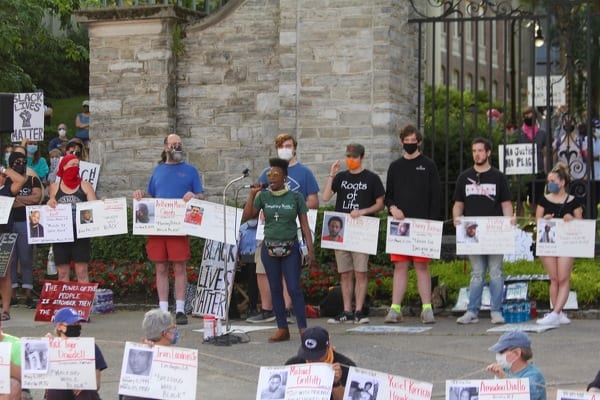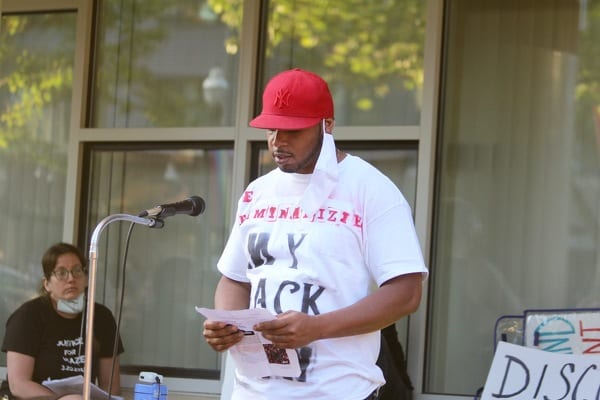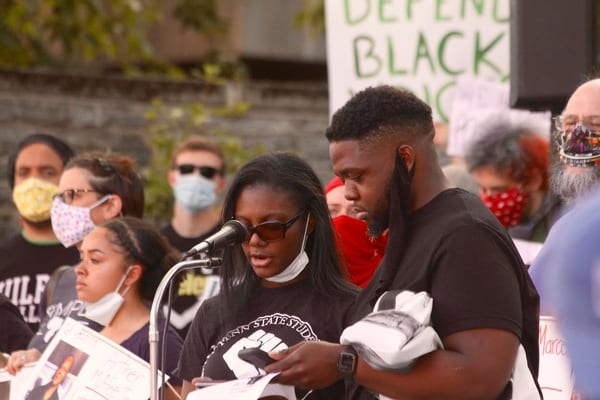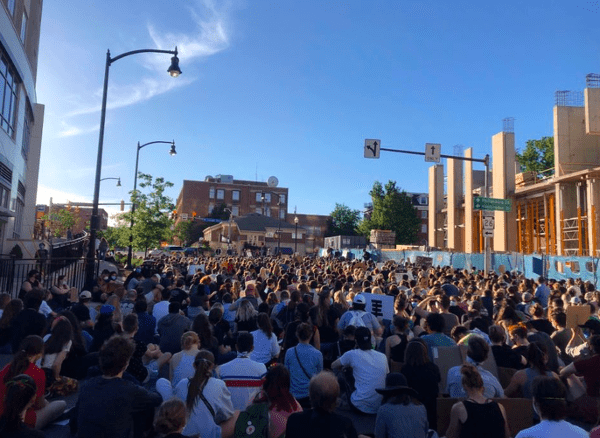Hundreds of community members gathered once again on Sunday evening in downtown State College, lining both sides of the street at the intersection of College Ave and South Allen Street for a ‘Justice for Black Lives’ protest.
The three-hour, peaceful demonstration against police brutality and racial injustice was the second in the past week in the borough, following a peaceful, four-hour rally and march on May 31.
Both are part of a nationwide movement of protests sparked by the killing of George Floyd, a 46-year-old black man who died on May 25 after a white Minneapolis police officer, Derek Chauvin, knelt on his neck for nearly nine minutes. The demonstrations have invoked other recent and past killings of unarmed black men and women and seek change to bring an end to systemic racism.
‘This is not a hashtag movement. This is a real-life revolution,’ said Tierra Williams. ‘All black people are asking for is equality. All we are asking for is justice. We’re not asking for anything else… We just want our lives to matter. We want our day in court, not our day in the street with somebody’s knee on our neck.’

Tierra Williams speaks in front of the Allen Gates. Photo by Geoff Rushton
Sunday’s protest, which began at 6 p.m., was organized by the 3/20 Coalition, an advocacy group formed in 2019 after Osaze Osagie, a 29-year-old black man, was shot and killed by State College police who had come to his apartment to serve a mental health warrant.
Osagie was a focus throughout the demonstration and march, with speakers often calling for the firing of the officer who shot and killed him and the naming of the other officers involved.
No charges were brought against the officers involved in that case. After an investigation by Pennsylvania State Police, Centre County District Attorney Bernie Cantorna concluded the shooting was justified, finding that the officer who killed Osagie was in a life-or-death situation when Osagie charged at him with a knife in a narrow hallway. Sgt. William Slaton, of the state police Heritage Affairs Section, said there was no evidence of racial bias involved in the incident.
Members of the 3/20 Coalition said they reject those findings and have continued over the past year to demand changes to police practices and oversight, as well as how mental health warrants are served in Centre County.

Protestors holding signs calling for justice for Osaze Osagie sit in the middle of South Atherton Street. Photo by Geoff Rushton.
The borough has undertaken several measures since Osagie’s death to address issues of race and mental health, including partnering with the county on a mental health task force, commissioning an independent assessment of police department practices and contracting with the National League of Cities Race, Equity, and Leadership (REAL) to lead an assessment, provide training and work with the borough and community members to develop a racial equity plan. State College also is reviewing the 2016 report by the Task Force on Policing and Communities of Color to determine how to act on recommendations that have not already been implemented.
The coalition, however, says their calls for change have largely gone unmet. In a recent letter to borough and county leaders, they outlined 10 demands — many of which they have been calling for over the past year.
Demands include creation of a community advisory board to address instances of discrimination in local government and police. Coalition members also called for ‘divestment of guns’ from the service of mental health checks and warrants; changes to multiple police practices and policies and a ban on chokeholds and knee holds; public access to officer misconduct information; releasing the names of officers involved in Osagie’s death and firing the officer who fired the fatal shots; financial compensation to the Osagie family; and reallocation of police funds to other programs.
Those demands were read by Penn State student Divine Lipscomb in front of the Municipal Building on South Allen Street, which houses police headquarters and where Sunday’s march came to an end.

Divine Lipscomb reads the 3/20 Coalition’s demands outside the State College Municipal Building.
The protest got underway earlier in the evening with speakers standing in front of the Allen Street Gates and encircled by community members holding signs with the names of some black men and women killed by police over the past decades.
‘As I stand here today I recognize we have been here before,’ said Devin McDuffie, a recent Penn State graduate and Black Caucus member. ‘America has; State College has; we have. Racism is as American as the flag. Let us remember the 401 years of terror brought over black Americans in this country…’
‘Let us remember Osaze, a black man killed during a welfare check here in State College on March 20, 2019,’ said Penn State senior and Black Caucus member Tyquise Edgerson. ‘We have all been here before. Osaze was murdered here in this town and we have still not received justice.’
Edgerson added that America is at a moment for action.
‘Now more than ever is the time to act. It is not enough to have a meaningless dialogue or give thoughts and well wishes,’ he said. ‘We need actions. We need policies. We need results that provide equity, dignity and respect. We can’t just call for diversity and inclusion. We must call for anti-racism as well.’

Devin McDuffie and Tyquise Edgerson speak at the Justice for Black Lives demonstration on June 7, 2020 in State College. Photo by Geoff Rushton
After several speakers and song, protesters began their march through Penn State’s campus before working their way back downtown with chants such as ‘Black Lives Matter and ‘Hands up, don’t shoot.’
The group eventually made its way to South Atherton Street where it sat in the road for several minutes. Speakers there included Penn State professor Errol Henderson, who last year authored the op-ed ‘Being Black at Penn State.’ Lauding participants for being part of the creation of a movement, Henderson spoke about Osagie’s death — calling for the case to be reopened — and racism at Penn State and in State College. The march then continued through downtown State College on its way to the municipal building.
Video by Geoff Rushton

The Justice for Black Lives demonstration filled South Atherton Street. Photo by Geoff Rushton.
At the municipal building, Charles Dumas, longtime civil rights activist and Penn State theatre professor, read his original piece ‘I Still Can’t Breathe.’
Video by Geoff Rushton
Several other speakers took the microphone as the sun began to set and a large crowd filled the road and sidewalks along the 200 block of South Allen Street.
‘We are not going away and we are not stopping until we gain justice for Osaze,’Williams said.
‘We are not here today because we want to be… We are here today because we are compelled to be here,’ said Nanre Nafziger.
The event concluded just before 9 p.m. as Nafziger led the crowd in a verse from ‘We Shall Overcome.’
Another protest is scheduled for noon on Sunday, June 14, at the Allen Street Gates, organizers said.



